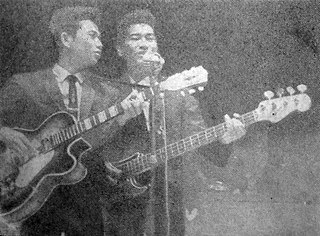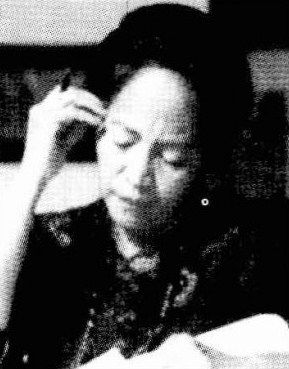
Minangkabau people, also known as Minang, are an Austronesian ethnic group native to the Minangkabau Highlands of West Sumatra, Indonesia. The Minangkabau's West Sumatera homelands was the seat of the Pagaruyung Kingdom, believed by early historians to have been the cradle of the Malay race, and the location of the Padri War.

As it is a country with many different tribes and ethnic groups, the music of Indonesia itself is also very diverse, coming in hundreds of different forms and styles. Every region has its own culture and art, and as a result traditional music from area to area also uniquely differs from one another. For example, each traditional music are often accompanied by their very own dance and theatre. Contemporary music scene have also been heavily shaped by various foreign influences, such as America, Britain, Japan, Korea, and India.

Minangkabau is an Austronesian language spoken by the Minangkabau of West Sumatra, the western part of Riau, South Aceh Regency, the northern part of Bengkulu and Jambi, also in several cities throughout Indonesia by migrated Minangkabau. The language is also a lingua franca along the western coastal region of the province of North Sumatra, and is even used in parts of Aceh, where the language is called Aneuk Jamee.

Dangdut is a genre of Indonesian folk music that is partly derived and fused from Hindustani, Arabic and to lesser extent, Malay, Javanese, Sundanese and local folk music. Dangdut is the most popular musical genre in Indonesia and very popular in other Maritime Southeast Asian countries as well because of its melodious instrumentation and vocals. Dangdut features a tabla and gendang beat.

West Sumatra is a province of Indonesia. It is on the west coast of the island of Sumatra and includes the Mentawai Islands off that coast. West Sumatra borders the Indian Ocean to the west, as well as the provinces of North Sumatra to the north, Riau to the northeast, Jambi to the southeast, and Bengkulu to the south. The province has an area of 42,119.54 km2 (16,262.45 sq mi), with a population of 5,534,472 at the 2020 census. The official estimate at mid 2022 was 5,640,629. The province is subdivided into twelve regencies and seven cities. It has relatively more cities than other provinces outside Java, although several of them are relatively low in population compared with cities elsewhere in Indonesia. Padang is the province's capital and largest city.

Padang is the capital and largest city of the Indonesian province of West Sumatra. It had a population of 833,562 at the 2010 Census and 909,040 at the 2020 Census; the official estimate as at mid 2022 was 919,145 - comprising 461,712 males and 457,433 females. It is the 16th most populous city in Indonesia and the most populous city on the west coast of Sumatra. The Padang metropolitan area is the third most populous metropolitan area in Sumatra with a population of over 1.4 million. Padang is widely known for its Minangkabau culture, cuisine, and sunset beaches.

Raden Haji Oma Irama, better known as Rhoma Irama, is an Indonesian dangdut singer, songwriter and guitarist of Sundanese descent.

The rebana or terbangan is a tambourine that is used in Islamic devotional music in Southeast Asia, particularly in Indonesia, Malaysia, Brunei, and Singapore. The sound of the rebana often accompany Islamic ritual such as the zikir. The name rebana came from the Arabic word robbana. The rebana is also used by the Cham people of Cambodia and also gave rise to the Rabana which is used by the Sinhalese people of Sri Lanka.

Pencak silat is an umbrella term for a class of related Indonesian martial arts. In neighbouring countries, the term usually refers to professional competitive silat. It is a full-body fighting form incorporating strikes, grappling, and throwing, in addition to weaponry. Every part of the body is used and subject to attack. Pencak silat was practiced not only for physical defense but also for psychological ends. There are hundreds of different pencak silat styles and schools which tend to focus either on strikes, joint manipulation, weaponry, or some combination thereof.

Dorce Gamalama was an Indonesian pop singer, actress, presenter, and comedian, who was a trans woman. She was often referred to as "Bunda".

The Overseas Minangkabau is a demographic group of Minangkabau people of Minangkabau Highlands origin in Central Sumatra, Indonesia who have settled in other parts of the world. Over half of the Minangkabau people can be considered overseas Minangkabaus. They make up the majority of the population of Negeri Sembilan and Pekanbaru. They also form a significant minority in the populations of Jakarta, Bandung, Medan, Batam, Surabaya and Palembang in Indonesia as well as Kuala Lumpur, Malacca, Penang, Singapore and Brunei Darussalam in the rest of the Malay world. Minangkabaus have also emigrated as skilled professionals and merchants to the Netherlands, United States, Saudi Arabia and Australia. The matrilineal culture and economic conditions in West Sumatra have made the Minangkabau people one of the most mobile ethnic group in Maritime Southeast Asia.

Koes Plus, formerly Koes Bersaudara, was an Indonesian musical group that enjoyed success in the 1960s and 1970s. Known as one of Indonesia's classic musical acts, the band peaked in popularity in the days far before the advent of private television companies, delivering stripped-down pop and rock songs at the then-only TV station, TVRI.

Benyamin Sueb was an Indonesian comedian, actor and singer. He released 46 studio albums and starred in more than 50 films. He received two Citra Awards for Intan Berduri in 1973 and Si Doel Anak Modern in 1975.

Dara Puspita was an all-female pop group from Surabaya, Indonesia, active in the 1960s and early 1970s. The band consisted of Titiek Adji Rachman, Susy Nander (drums), Lies Adji Rachman and Titiek Hamzah (bass).

Ratu was an Indonesian music duo formed in 1999 with Maia Estianty, then the wife of musician Ahmad Dhani, on instruments and Pinkan Mambo on vocals. Ratu entered the Indonesian musical scene with their first album, Bersama. After a short break caused by Mambo's departure in 2004, the group formed anew with Mulan Kwok as vocalist. This new line-up proved more successful, with their most successful songs – "Teman Tapi Mesra" and "Lelaki Buaya Darat" ("Womaniser") – released in this period; both song titles later became common terms in the Indonesian vocabulary. The group's second studio album, No. Satu, sold 200,000 copies on the day of its release, a record for an album by an Indonesian female group. The group dissolved in 2007.

Maia Estianty, formerly known as Maia Ahmad during her marriage to fellow musician Ahmad Dhani, is an Indonesian singer and composer.

Gusmiati Suid (1942–2001) was an Indonesian dancer and choreographer who specialized in traditional Sumatran, Malay and Minang dances. She studied and later taught dance at the ASKI Performing Arts Academy in Padang Panjang. In 1984, she decided to become a professional choreographer, devoting her efforts to the Gumarang Sakti Dance Company which she had created in 1982. Gusmiati toured widely with the company in the late 1980s and the 1990s, visiting India, France, Germany, the United States, Canada and New Zealand. In her choreographic compositions from 1985 to 1991, she succeeded in combining martial arts-based dances with her own interpretations of Minang music.

Minangkabau culture is the culture of the Minangkabau ethnic group in Indonesia, part of the Indonesian culture. This culture is one of the two major cultures in the Indonesian archipelago which is very prominent and influential.

Music of Minang is a traditional and living genre of Indonesian music that grows and develops in the Minangkabau culture area. Music whose origins are related to Malay Music is generally played by musical instruments such as Talempong, Saluang, Minang rebab, Serunai, Tmbourine, Aguang, Gandang, and Violin. Minang music is also played to accompany various dances such as the Pasambahan dance and the Piring dance.

Universal Music Indonesia is an Indonesian company based in Jakarta. Founded in 1987, the company is a branch of Universal Music Group. This company has produced several successful singers on the Asian music scene such as Marion Jola, Tiara Andini, Ziva Magnolya, Keisya Levronka, and Lyodra.

















